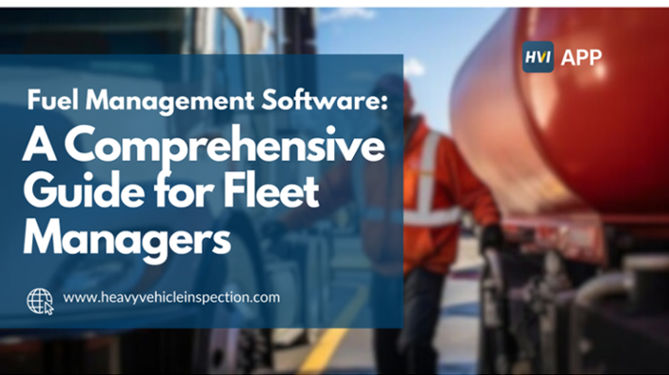In today's data-driven world, fleet managers, safety managers, and maintenance managers are turning to advanced technology solutions to optimize their operations. Fuel management software has emerged as a crucial tool for managing fleets efficiently, reducing costs, and ensuring compliance with safety regulations. This article explores the best practices for implementing a comprehensive fuel management software solution, such as Heavy Vehicle Inspection and how it can revolutionize your fleet management processes.
The Evolution of Fuel Management
Over the years, fuel management has undergone a significant transformation. Traditional methods, such as manual record-keeping and spreadsheets, have given way to sophisticated software solutions that leverage data analytics and automation. This shift has empowered fleet managers to make informed decisions based on real-time insights, leading to improved efficiency and cost savings.
Embracing Technology for Optimal Results
Adopting a fuel management software solution is a game-changer for fleet operations. Platforms like Heavy Vehicle Inspection offer a centralized database that integrates all aspects of fleet management, including inspection, maintenance, fuel tracking, and safety compliance. By automating tasks and providing actionable data, these solutions enable fleet managers to streamline processes, identify areas for improvement, and make data-driven decisions.
Key Features to Look for in Fuel Management Software
When selecting a fuel management software solution, consider the following essential features:
Fuel Tracking and Monitoring: Accurate fuel consumption tracking is crucial for optimizing fuel efficiency and identifying potential issues. Look for software that provides real-time fuel level monitoring, fuel usage analytics, and customizable reports.
Integration with Telematics: Integrating fuel management software with telematics systems allows for seamless data exchange, enabling fleet managers to correlate fuel consumption with vehicle performance, driver behavior, and route optimization.
Maintenance and Inspection Management: A comprehensive solution should include tools for scheduling and tracking vehicle maintenance, inspections, and repairs. This ensures timely servicing, reduces downtime, and improves overall fleet performance.
Safety Compliance: Fuel management software should help fleet managers maintain compliance with safety regulations. Features like driver behavior monitoring, incident reporting, and automated alerts contribute to a safer fleet environment.
Customization and Scalability: Every fleet is unique, so choose a software solution that offers customization options to meet your specific requirements. Additionally, ensure that the system is scalable to accommodate future growth and evolving needs.
Best Practices for Implementation and Adoption
To maximize the benefits of fuel management software, consider the following best practices:
Involve Key Stakeholders: Engage fleet managers, safety managers, and maintenance managers in the software selection and implementation process. Their insights and buy-in are critical for successful adoption.
Provide Comprehensive Training: Ensure that all relevant personnel receive thorough training on using the software effectively. Regular refresher sessions can help maintain proficiency and address any challenges.
Set Clear Goals and KPIs: Establish specific goals and key performance indicators (KPIs) to measure the impact of the fuel management software. Regularly review and analyze data to identify areas for improvement and celebrate successes.
Foster a Data-Driven Culture: Encourage a culture that values data-driven decision-making. Empower fleet managers to leverage the insights provided by the software to optimize operations and drive continuous improvement.
Conclusion
Fuel management software has become an indispensable tool for fleet managers, safety managers, and maintenance managers seeking to optimize their operations in a data-driven world. By embracing advanced solutions like Heavy Vehicle Inspection, organizations can streamline processes, reduce costs, enhance safety, and make informed decisions based on real-time insights. Implementing best practices and fostering a data-driven culture are key to unlocking the full potential of fuel management software and driving success in fleet management.
Ready to transform your fleet management? Discover how our advanced fuel management software can streamline your operations, cut costs, and improve safety. Click here to start optimizing with real-time insights and best practices today!
Optimizing Fleet Efficiency: Key FAQs on Fuel Management Software
1. What are the key benefits of integrating telematics with fuel management software?
Integrating telematics with fuel management software enhances fleet operations by providing real-time data on vehicle performance, driver behavior, and fuel usage. This integration helps in optimizing routes, reducing fuel consumption, and improving overall fleet efficiency.
2. How does fuel management software contribute to safety compliance in fleet operations?
Fuel management software aids in safety compliance by monitoring driver behaviors that could lead to increased fuel consumption or accidents, such as speeding or harsh braking. It also ensures maintenance schedules are followed, which keeps vehicles in safe operating condition.
3. Can fuel management software be customized to fit specific fleet needs?
Yes, most fuel management software solutions offer customizable features to cater to the unique needs of different fleets. Whether it's scaling the solution to fit the size of the fleet or adjusting the parameters for monitoring and reports, the software can be tailored to meet specific operational requirements.
4. What kind of cost savings can be expected from implementing fuel management software?
Implementing fuel management software typically results in cost savings from reduced fuel consumption, optimized vehicle maintenance, and improved route management. Fleets can often see a reduction in operational costs by 10-30%, depending on the extent of software utilization and adherence to data-driven insights.
5. What steps should be taken to ensure successful adoption of fuel management software within a fleet?
For successful adoption, it's crucial to involve all key stakeholders from the outset, provide comprehensive training to users, set clear goals and KPIs to measure software impact, and foster a culture that embraces data-driven decision-making. Regularly reviewing these metrics and adapting to feedback also helps in refining the implementation for better results.
Ready to take fleet management to the next level?
See how our all-inclusive fleet management solution, complete with Geotab GPS & Telematics integration, can enhance your business.
Try Free Now Demo Today




